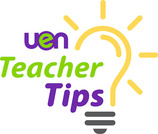
This Canva presentation can help elementary teachers instruct students in protecting private information.
- Subject:
- Educational Technology
- Professional Learning
- Material Type:
- Lesson
- Provider:
- Jordan School District
- Date Added:
- 02/13/2024

This Canva presentation can help elementary teachers instruct students in protecting private information.

This Canva presentation can help high school teachers instruct students in protecting private information.

This Canva presentation can help middle school teachers instruct students in protecting private information.

Guilty of using your pet’s name as your password? Creating a strong password is one of your best lines of defense.

This is a lesson plan created by Copyright & Creativity for Ethical Digital Citizens. In this lesson plan, young students learn the importance of attribution—getting credit for the work they do and giving credit to others for their creative work. Included with this resource are the lesson plan (pdf), and links to an accompanying Google Slides presentation and YouTube video.

In this K-2 Digital Citizenship and Technology Nearpod activity, students will identify and explain classroom and home rules for technology.

This is a lesson plan created by Copyright & Creativity for Ethical Digital Citizens. This lesson introduces the concept of fair use. It promotes creative expression and gives students experience with the basic idea of copyright. This resource includes the lesson plan (pdf) and links to an accompanying Google Slides presentation and YouTube video.

This article describes how one school implemented digital citizenship instruction during restorative circles and throughout the school day as part of their PBIS plan.

Google’s digital safety curriculum is focused on teaching students to be smart, alert, strong, kind, and brave online. (Spanish version)

Lots of middle schoolers post and share information about themselves – and others – on social media. But in a world where “oversharing” might seem normal, it’s important to think about our digital footprints -- the things we leave behind online. In this video, you'll hear what teens have to say about sharing on social media, and you can think critically about the decisions you're making any time you post something online.

Lots of middle schoolers post and share information about themselves – and others – on social media. But in a world where “oversharing” might seem normal, it’s important to think about our digital footprints -- the things we leave behind online. In this video, you'll hear what teens have to say about sharing on social media, and you can think critically about the decisions you're making any time you post something online.

In this Common Sense Education lesson on Digital Citizenship, students learn how recognize the kind of information that is private. They will work in pairs to practice having boundaries in sharing information.

UEN Teacher Tips is a weekly series from the UEN Professional Development team. Every Tuesday, we'll share a new tip, how-to video and classroom resource. When life is busy and time is short, we hope these tips lead to bright ideas, just in time! This week's tip is "5 Tips To Talk About Digital Citizenship Every Day" by Dani Sloan.

This Canva presentation can help middle school teachers instruct students in using digital tools for good.

This Canva presentation can help elementary teachers instruct students in using reliable sources.

This Canva presentation can help elementary teachers instruct students in passwords that protect.

This Canva presentation can help middle school teachers instruct students in using technology responsibly.

This Canva presentation can help high school teachers instruct students in using technology responsibly.

This Canva presentation can help elementary teachers instruct students in using technology responsibly.

In this 6-8 Digital Citizenship and Technology Nearpod Drag & Drop activity, students will identify actions that maintain healthy and unhealthy media use.